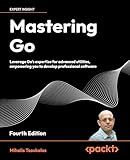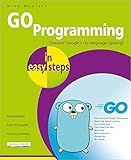Best Go Function Argument Techniques to Buy in February 2026

Go Programming Language, The (Addison-Wesley Professional Computing Series)



Learning Go: An Idiomatic Approach to Real-World Go Programming



Mastering Go: Leverage Go's expertise for advanced utilities, empowering you to develop professional software



100 Go Mistakes and How to Avoid Them



Network Programming with Go: Code Secure and Reliable Network Services from Scratch



Learn Concurrent Programming with Go



GO Programming in easy steps: Learn coding with Google's Go language



System Programming Essentials with Go: System calls, networking, efficiency, and security practices with practical projects in Golang



Head First Go


In Golang, it is possible to pass functions as arguments to other functions. This allows for creating more flexible and reusable code by treating functions as variables.
To pass a function as an argument, you need to define the function parameter with the appropriate function type. The syntax for function types is func(<parameter list>) <[return type](https://ubuntuask.com/blog/how-to-allow-result-t-to-be-return-type-in-kotlin)>. For example, func(int) int represents a function that takes an integer argument and returns an integer.
Once you have defined the function type, you can pass a function of that type as an argument to a function. To do this, simply provide the function name without invoking it, i.e., without adding parentheses after the function name.
Inside the receiving function, you can call the passed function by using the function name followed by parentheses and the necessary arguments.
Here's an example to demonstrate passing a function as an argument:
package main
import "fmt"
// Function type declaration type mathFunc func(int, int) int
// Function that takes a function as an argument func calculate(a, b int, operation mathFunc) int { return operation(a, b) }
// Function to be passed as an argument func addition(a, b int) int { return a + b }
// Function to be passed as an argument func subtraction(a, b int) int { return a - b }
func main() { result := calculate(5, 3, addition) fmt.Println("Addition result:", result)
result = calculate(5, 3, subtraction)
fmt.Println("Subtraction result:", result)
}
In this example, the calculate function takes two integers and a function as arguments. The function type mathFunc is defined as a function that takes two integers and returns an integer. The calculate function then calls the passed function with the provided integer arguments.
The main function demonstrates how to pass the addition and subtraction functions as arguments to calculate and prints the results.
By passing functions as arguments, you can achieve more flexible and modular code in Golang.
How to pass anonymous functions as arguments in Golang?
To pass anonymous functions as arguments in Golang, you can use the concept of "callback functions". Here's an example:
package main
import "fmt"
func main() { // Pass anonymous function as an argument doSomething("Hello", func(msg string) { fmt.Println(msg) }) }
func doSomething(msg string, callback func(string)) { // Perform some task // ...
// Call the callback function
callback(msg)
}
In the above example, we define a doSomething function that takes two arguments: msg (a string) and callback (a function that takes a string argument). Inside doSomething, we perform some task (omitted for brevity) and then call the callback function, passing the msg argument.
When calling doSomething, we pass an anonymous function as the callback argument. This anonymous function simply prints out the passed message.
How to pass a function with a variable number of arguments as an argument in Golang?
In Golang, functions can be passed as arguments just like any other value. You can pass a function with a variable number of arguments as an argument by using the ... operator to indicate a variadic parameter.
Here's an example of how you can pass a function with a variable number of arguments as an argument in Golang:
// Define a function type with a variadic parameter type funcWithVariadicArgs func(...int)
// Function that accepts a function with variable arguments func processFunc(f funcWithVariadicArgs) { // Call the function with some arguments f(1, 2, 3) }
// Function with variable arguments func myFunc(nums ...int) { for _, num := range nums { fmt.Println(num) } }
func main() { // Pass myFunc as an argument to processFunc processFunc(myFunc) }
In the example above, the processFunc function accepts a function with a variadic parameter as an argument. The myFunc function is defined with the variadic parameter nums ...int. Inside processFunc, the passed function is called with the arguments 1, 2, 3.
Note that the type funcWithVariadicArgs is created to represent a function with variadic arguments. This allows us to specify that the function passed to processFunc should have a variadic parameter.
What is the syntax for passing a function as an argument in Golang?
In Golang, you can pass a function as an argument by specifying the function type as the parameter type.
The syntax for passing a function as an argument in Golang is as follows:
func main() { // Define a function type type Operator func(int, int) int
// Pass a function as an argument to another function
performOperation(5, 7, add)
// Another example
performOperation(10, 3, multiply)
}
// Function that accepts a function as an argument func performOperation(a, b int, op Operator) { result := op(a, b) fmt.Println("Result:", result) }
// Example functions that match the Operator function type func add(a, b int) int { return a + b }
func multiply(a, b int) int { return a * b }
In this example, we define a function type Operator that takes two integers as parameters and returns an integer. We then pass two different functions (add and multiply in this case) as arguments to the performOperation function, which accepts a function of type Operator. The performOperation function calls the passed function and prints the result.
How to pass a function type as an argument in Golang?
In Go, you can pass a function type as an argument by defining a variable of function type and passing it to another function. Here's an example:
package main
import "fmt"
func greet(name string) { fmt.Println("Hello,", name) }
func printMessage(messageFunc func(string)) { messageFunc("John") }
func main() { printMessage(greet) }
In this example, we have two functions - greet and printMessage. The greet function takes a string argument and prints a message. The printMessage function takes a function type as an argument named messageFunc. Inside printMessage, we call messageFunc and pass the argument "John". In the main function, we pass greet as an argument to printMessage, so it will execute greet("John") and print "Hello, John".
When passing a function type as an argument, the signature of the function type (number and type of arguments, return type) must match the signature expected by the receiving function.
What is currying and can it be achieved when passing functions as arguments in Golang?
Currying is a functional programming technique that allows you to convert a function that takes multiple arguments into a sequence of functions, each taking a single argument. The resulting sequence of functions can then be partially applied by fixing some of the arguments, which creates a new function with fewer arguments.
In Go, currying is not natively supported because functions cannot be partially applied. However, you can achieve a similar effect by using closures. By defining a function that returns another function, you can capture the arguments of the first function and use them in the returned function.
Here's an example to illustrate this concept:
package main
import "fmt"
func add(a int) func(int) int { return func(b int) int { return a + b } }
func main() { add2 := add(2) // Partially applying 'add' with 'a=2' fmt.Println(add2(3)) // Outputs 5 }
In the example, the add function takes an integer a and returns an anonymous function that takes another integer b and returns the sum of a and b. By calling add(2), we get a new function add2 that adds 2 to any given number. We can then call add2(3), which will output 5.
So while Go doesn't have direct support for currying, you can achieve a similar effect using closures and function returning functions.
How to pass a function that returns a value as an argument in Golang?
In Go, you can pass a function as an argument to another function by using the function type declaration as the parameter type. If the function also returns a value, you can specify the return type along with the function type. Here's an example:
package main
import ( "fmt" )
// Function type declaration type myFunc func(int) int
// Function that takes another function as an argument func applyFunction(f myFunc, value int) { result := f(value) fmt.Println("Result:", result) }
// Example function to be passed as an argument func increment(x int) int { return x + 1 }
func main() { applyFunction(increment, 5) }
In the above example, we have defined a function applyFunction that takes a function type myFunc and an int value as arguments. Inside applyFunction, we call the passed function with the given value and print the result.
We also define another function increment that takes an int argument and returns the incremented value. In the main function, we call applyFunction and pass the increment function as an argument along with the value 5.
When you run this program, it will output:
Result: 6
What is a higher-order function in Golang?
In Go, a higher-order function refers to a function that takes one or more functions as parameters and/or returns a function as its result. This concept is derived from functional programming paradigms and allows developers to build more flexible and modular code.
Higher-order functions enable you to create generic and reusable code by abstracting common patterns in your program. They can be used to implement functional programming techniques such as mapping, filtering, reducing, and composing functions.
Here's an example of a higher-order function in Go:
func applyOperation(a, b int, operation func(int, int) int) int { return operation(a, b) }
func add(a, b int) int { return a + b }
func multiply(a, b int) int { return a * b }
func main() { result1 := applyOperation(5, 3, add) // 5 + 3 = 8 result2 := applyOperation(5, 3, multiply) // 5 * 3 = 15 fmt.Println(result1, result2) }
In this example, applyOperation is a higher-order function that takes two integers and a function as parameters. It then applies the given function to the integers and returns the result. The add and multiply functions are passed as arguments to applyOperation to perform addition and multiplication, respectively.
What is the difference between passing a function as an argument and assigning it to a variable in Golang?
In Golang, passing a function as an argument and assigning it to a variable serve different purposes.
- Passing a function as an argument: This is done when you want to pass a function to another function as an argument. It allows you to use different functions interchangeably, as long as they have the same signature (input and output arguments). The receiving function can then call or invoke the passed function as needed.
Example:
func applyFunction(f func(int, int) int, a, b int) int { return f(a, b) }
func add(a, b int) int { return a + b }
func main() { result := applyFunction(add, 3, 4) fmt.Println(result) // Output: 7 }
- Assigning a function to a variable: This is useful when you want to store a function in a variable for later use. It allows you to treat the function as a value that can be assigned, passed around, or used dynamically based on certain conditions.
Example:
func add(a, b int) int { return a + b }
func main() { var operation func(int, int) int operation = add result := operation(3, 4) fmt.Println(result) // Output: 7 }
In this example, the operation variable is assigned the add function, and then later invoked with arguments to get the result. This can be useful in dynamic scenarios where the choice of function to be used is determined at runtime.
What is the purpose of passing functions as arguments in Golang?
Passing functions as arguments in Golang allows for greater flexibility and code reusability. It enables the creation of higher-order functions, which are functions that take other functions as arguments or return them as results.
Here are some common use cases and benefits of passing functions as arguments in Golang:
- Callback functions: They allow you to pass a function as an argument to another function to be executed at a certain point. This is commonly used for event handling or asynchronous operations.
- Function composition: It enables the creation of more complex functions by combining smaller and reusable functions. By passing functions as arguments, you can define the behavior of a function dynamically, making it more adaptable to different scenarios.
- Dependency injection: By passing functions as arguments, you can inject dependencies into a function instead of hard-coding them. This promotes decoupling, simplifies testing, and makes code more maintainable.
- Strategy pattern: It allows you to change the behavior of an algorithm at runtime by passing different functions as arguments. This aids in creating more flexible and extensible code.
Overall, passing functions as arguments in Golang enables functional programming paradigms, enhances code modularity, and allows for greater code reuse and maintainability.
